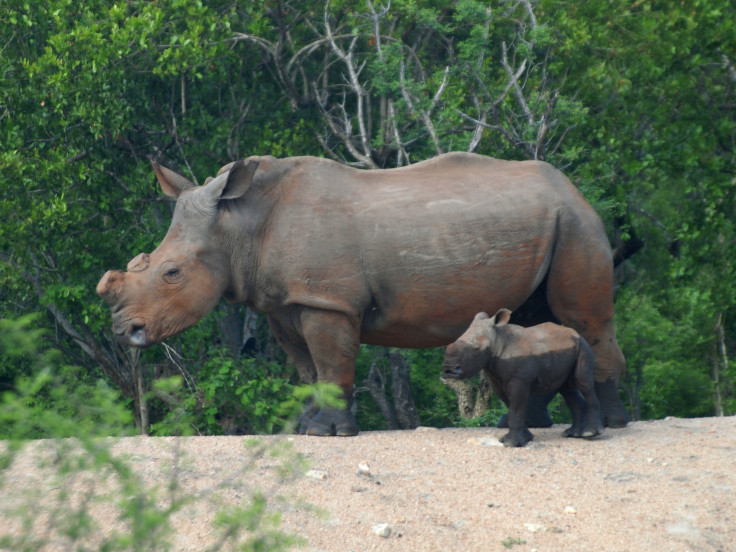Rhino Horn Trade Should Be Legalized To Stave Off Extinction, Scientists Say

Several scientists are calling on the world to open up a legal trade in rhino horn to stem accelerating poaching rates and provide a last-ditch defense against extinction.
Rhino horn is traditionally used in Chinese traditional medicine and crafted into dagger handles in Yemen. Recently, powdered rhino horn has gained popularity as a hangover cure (when mixed into a tincture) and as a party drug (when mixed with wine) among the Vietnamese nouveau riche. The horn is made of keratin, which also forms human hair and fingernails, and is about as effective a drug as ground-up toenail clippings.
Still, a persistent belief in rhino horn’s medicinal and psychoactive properties has driven up prices to anywhere from $65,000 to $90,000 per kilogram, making it more valuable by weight than gold, diamonds or cocaine. In 2012, 668 rhinos were killed in South Africa alone. Over the past 5 years, poaching in South Africa has more than doubled each year. Park rangers are finding themselves locked in gun battles. Drones are being deployed in African national parks to look for poachers.
But what if a better way to fight the black market is to bring it into the light? Some conservation agencies in South Africa are doing just that; they’ve asked their nation’s government to put together a proposal for a legal international trade in rhino horns. South Africa’s environment minister told AFP on Thursday that the government is looking into it.
In a paper published on Thursday in the journal Science, University of Queensland researcher Duan Biggs and colleagues from France and Zimbabwe lay out the case for lifting the rhino horn ban, which was put in place in 1977 as part of the Convention on the Trade of Endangered Species, or Cites. Restricting the trade may actually be fueling poaching, they said.
“As wildlife products, such as rhino horn, become rarer, their prices soar, which pushes them ever further into an economic supply-and-demand extinction vortex,” Biggs and his colleagues wrote.
In contrast, legalization could stem the flow of illegal rhino horn with little harm to the animals and a boon for conservationists, they said. Harvesting horn from a sedated rhino can be done for as little as $20. Based on estimates for the black market in rhino horn, 5,000 of the white rhinos living in South Africa could meet the demand for quack cancer cures and useless party drugs throughout Asia. Income from the legal horn trade could then be put to conservation purposes.
Biggs and his colleagues point to the crocodile skin trade as an example of how a well-regulated animal product regime can aid conservation. Crocodile farming gained momentum in the 1960s and 1970s as wild populations declined, and nowadays many areas have seen a reptile rebound.
For a legal rhino horn trade to succeed, individual horns must be able to be tracked through the selling chain to minimize laundering. This can be accomplished using small transponders attached to traded rhino horns and using DNA signatures to distinguish one horn from another, Biggs and his colleagues said.
But not all conservationists were eager to jump on board. The World Wildlife Fund, for one, was skeptical about the proposal.
“The contention that legal trade would lead to a reduction in rhino poaching and illegal trade in rhino horn hinges upon assumptions; it is not proven fact,” WWF said in an emailed statement.
There are too many unresolved concerns about how a legal rhino horn trade might undermine conservation efforts, according to the WWF.
“There are risks of a legal rhino horn market serving as a conduit for laundering rhino horns of illegal origin, increasing consumer demand in end-use markets and confounding existing law enforcement,” the WWF said. “The current poaching crisis epidemic, combined with insufficient political will and law enforcement, means there is insufficient deterrent against this illegal activity, especially in Vietnam. Therefore, the situation is not stable enough to entertain any consideration of legal trade in rhino horn.”
In March, experts will converge on Bangkok for a Cites meeting that could kick-start a conversation about legalization. But the clock is ticking -- in 2011, the western black rhinoceros, which once lived in Cameroon, Chad and South Sudan, was declared extinct by the International Union for the Conservation of Nature. Five-thousand black rhinos and about 20,000 white rhinos remain in Africa, and without a serious turn of the tide, they could become extinct within decades.
"Legitimizing the market for horn may be morally repugnant to some, but it is probably the only sensible way to prevent extinction of Africa's remaining rhinos,” Biggs and his colleagues wrote.
SOURCE: Biggs et al. “Legal Trade of Africa’s Rhino Horns.” Science 339: 1038-1039, 1 March 2013.
© Copyright IBTimes 2024. All rights reserved.





















